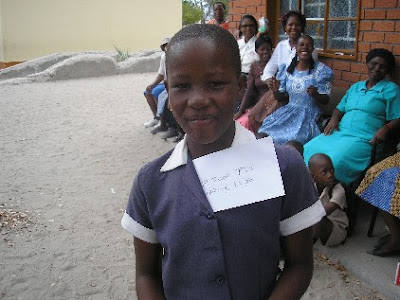My friend at Global Lab is always reminding me about neo-liberal economic principles and consumerism and he's not the only one! Today I learned (via Four Hour Work Week Blog) about some who are going the beyond the No-shopping-for-a-day! stuff, which always seems pointless to me. Some have tried no shopping for a year!
I enjoyed this little exchange on broken head phones. I wonder how long I could last in such a Compact. Of course, I know that ending shopping would end economic growth and we can do that, right, Global Lab. ;-) But it is nice to be pushed to think a bit harder about how often we run to the shop for a new set of head phones when many-a-friend probably has an extra pair. I have two extra if anyone needs a set.
Here are the rules they set up.
I also liked what a reader named liz said after reading the rules...
ah... america... where the upper class can take the higher ground by resolving to live a consumer life somewhat like the majority, who cannot afford to choose such a lifestyle choice, and publish their efforts to make themselves feel better, while arguing inane cop outs of their original decision. go for the gold team america!
OK, Liz, you are right, don't be such a little anti-american. Can't they pose the questions and dare to think a bit harder about it all? Humor us, please.
Oh yeah, and Buy(Less)!
Wednesday, November 28, 2007
Sunday, November 11, 2007
Attention for the "Bottom Billion"
The Bottom Billion is worth a read. In fairness, I should read the End of Poverty since I already read and have been positively provoked by The White Man's Burden (which I don't feel places me on the right, as Collier suggests, anymore than I would call Sachs a defender of the left, but that is another story for other posts).
Summaries and reviews of Collier are plentiful, here and here and here so I won't bother with that.
I think it contributes some clarity to "conditionality" in the international development discussions and the term "governance conditionality" - that which is based on broadly agreed international norms - is an area I think might gain traction in a new information-obsessed world.
The greatest contribution is his analysis of laws and charters. Clearly, no international court is in the near future, but he cites the progress - note that I stop short of calling them "successes" - of initiatives like the Kimberly Process and Extractive Industries Transparency Initiative. I would add that voluntary initiatives such as the Equator Principles, which I use a lot in my work, are re-focusing the debate on role and responsibilities in international development. There is less turning a blind eye to the indirect impacts of our actions.
I was less offended than I expected to be about his arguments for military intervention. He certainly doesn't defend the blunders of Iraq and rather tries to re-think Somalia and Rwanda and how they might have followed a scenario more like what he considers to be successful interventions like Sierra Leone.
Summaries and reviews of Collier are plentiful, here and here and here so I won't bother with that.
I think it contributes some clarity to "conditionality" in the international development discussions and the term "governance conditionality" - that which is based on broadly agreed international norms - is an area I think might gain traction in a new information-obsessed world.
The greatest contribution is his analysis of laws and charters. Clearly, no international court is in the near future, but he cites the progress - note that I stop short of calling them "successes" - of initiatives like the Kimberly Process and Extractive Industries Transparency Initiative. I would add that voluntary initiatives such as the Equator Principles, which I use a lot in my work, are re-focusing the debate on role and responsibilities in international development. There is less turning a blind eye to the indirect impacts of our actions.
I was less offended than I expected to be about his arguments for military intervention. He certainly doesn't defend the blunders of Iraq and rather tries to re-think Somalia and Rwanda and how they might have followed a scenario more like what he considers to be successful interventions like Sierra Leone.
Thursday, November 08, 2007
Still my favorite blog!

Congrats to Kedibonye Elijah, winner of the HIV essay contest, and especially to the two creators of Nata Blog. What an amazing model for getting support and sharing your stories.
C.A.R. Blog?!?
This is leap-frogging at its best! Kudos to the Humanitarian and Development Partners - Central African Republic for a Web 2.0-charged blog and intranet for Humanitarian and Development agencies. I learned about it from friend and was gutted to have missed the presentation of Tony Lanzer at the LSE. You can still see the presentation online with power point.
Everyone should learn a little bit about CAR..., but somewhat only an aid story. More on that later.
Everyone should learn a little bit about CAR..., but somewhat only an aid story. More on that later.
Wednesday, November 07, 2007
More on mosquito economics
 To subsidize or not to subsidize, isn't that always the Economist's question? It was in Money v mosquito, asking whether the Gates Foundation and World Bank should subsidize a malaria remedy to keep the price down.
To subsidize or not to subsidize, isn't that always the Economist's question? It was in Money v mosquito, asking whether the Gates Foundation and World Bank should subsidize a malaria remedy to keep the price down. (Has anyone else noticed that when you wish to blog about something, you end of finding five more things you should read?)
Tuesday, November 06, 2007
That's Random
I am a fan of the potential of randomized trials and was pleased to read an article in the 25 Oct 2007 issue of Nature called Field Trials Aim to Tackle Poverty. The Poverty Action Lab, featured in the article, is a good resource for me, but I thought the article was a bit unfair to the "debate" over handing out malaria bed nets for free or charging. (Here's the paper for those wishing to review their development economics.) They take a swipe at Population Services International, an organization I have appreciated in many contexts, mostly as they push people (me, especially) to see aid and health programs as more than just supplying the needed goods. It also requires socil marketing to help change behavior, or so I thought.
Maybe I will spend Sunday afternoon reading this and see if I was wrong all along.
Maybe I will spend Sunday afternoon reading this and see if I was wrong all along.
Subscribe to:
Posts (Atom)



